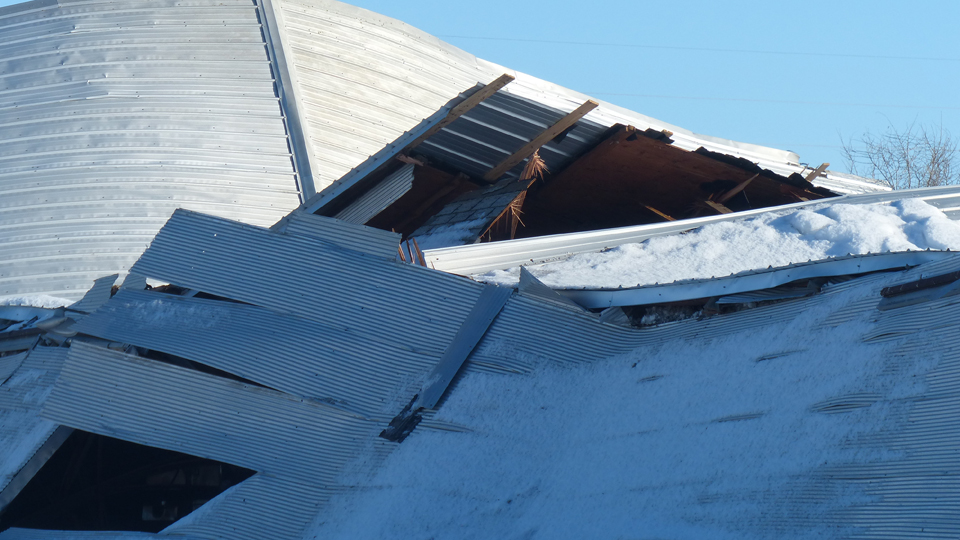
 This onion shed on Railroad Avenue outside Ontario collapsed from the weight of snow and ice in the wake of a series of storms. (Malheur Enterprise/Les Zaitz)
This onion shed on Railroad Avenue outside Ontario collapsed from the weight of snow and ice in the wake of a series of storms. (Malheur Enterprise/Les Zaitz)By Pat Caldwell
The Enterprise
ONTARIO – One of the most destructive winters storms in recent history has severely disrupted Malheur County’s onion industry. Sheds and packing plants are damaged and tons of onions have been lost to the usual market.
Approximately 20 onion storage and packing centers across the region endured serious damage, destroying one fourth of the area’s onion infrastructure.
Payette Produce suffered damage to two buildings from heavy snow, including the roof over its critical packing line.
“It fell right on top of our fresh packing line,” said Eddie Rodriguez, Payette Produce’s fresh pack sales director.
Rodriguez said the damage was a game-changer.
“We are done for the season in Payette, Idaho. All of our operations will move to our secondary facility in Ontario. It is not good,” he said.
The winter storm also inflicted serious damage on major onion producers outside the county that rely on local farmers for supply In Parma, a building containing 2,500 bins of onions failed. The loss is nearly $600,000, said Dwayne Fisher, Champion Produce partner and vice-president of marketing.
“We also have got structure issues with some other buildings. With more snow and freezing rain forecast we are not out of the woods,” he said.
When a roof of an onion storage shed fails most – if not all – of the produce is ruined. That’s because the storage sheds are regulated for temperature. When a structure fails, the computerized systems that manage the climate also crumple. Then there is the question of debris, Fisher said.
“From a food safety aspect there is no way for us to ensure there are no splinters or glass in the onions,” he said.
Finally, once the onions are exposed to the severe weather, they freeze.
Fisher said the total loss for his firm could escalate as onion prices climb.
“Over a half a million at the cheap market. And that is just the value of the onions. Not the shed or the bins,” he said.
Central Produce, an onion-packer and shipper based in Payette but with facilities in Malheur County, so far escaped major damage from the recent snow squalls, sales manager Dan Phillips said.
“We definitely have some buildings that are severely stressed but we are trying to utilize our resources to get those cleaned up,” he said.
Central Produce, he said, has not lost any packing time but the firm faces a challenge regarding shipping.
“Transportation is a mess. With storms in western Oregon and in Washington (state) have prevented trucks from getting down in our area,” he said.
Phillips said resources for onion packers are stretched locally.
Grant Kitamura of Murakami Produce in Ontario said the company escaped any serious damage but its costs have skyrocketed.
“We’ve had to use a lot of extra resources to keep our buildings clear. We have to haul snow out of here,” Kitamura said.
Kitamura said the price of onions climbed dramatically in the wake of the winter storms. Demand, he said, now outpaces supply.
Before the storm, a 50-pound bag of onions was selling for $3 to $3.50. The price since has nearly doubled.
“Prices have gone up $3 in a week because people can’t get them out and they can’t pack them,” he said.
Kitamura agreed with Phillips that transportation is evolving into a major problem for packers who escaped major damage.
“There are probably three or four shippers that can’t pack because their sheds collapsed into shipping lines. There are thousands of onions that have been destroyed in this deal,” he said.
Onions that can’t be marketed as usual can be converted into onion oil, produced by a plant outside Ontario. A bin typically holds the equivalent of about 25 50-pound bags of onions.
Kitamura said he has heard of several local onion producers and shippers that suffered serious damage from last week’s storm.
In Vale, Jamieson Produce suffered only minor damage from the storm. That’s because the firm was proactive and shoveled snow off roofs and reinforced structural weak spots, employee Kimi Fitch said.
“There was slight damage to some buildings from the snow falling off the roofs,” Fitch said. However, Fitch said Fry Foods, situated on Stanton Boulevard, had a building collapsed, which stopped Jamieson from shipping onions to be processed.
Standage Produce so far escaped serious problems from the storm, Coby Ingram said.
At Producers Livestock, office manager Jerrie Philpott said the severe weather last week forced the firm to cancel the weekly sale.
“Tuesday looked so bad. And we didn’t want to endanger employees,” Philpott said.
Philpott said her firm employs seven full-time and about 30 part-timers who work on sale day.
The severe weather onslaught, Philpott, did impact the firm.
“You got to have a sale to make money. Our employees couldn’t make any money because they couldn’t get here,” Philpott said.
Philpott said this year was the first one since she began work at Producers in 1995 that the sale yard had to cancel a sale because of weather.
The severe weather impacted area cattlemen.
“It has caused a lot of problems, caused a lot of extra work,” said Chris Christensen, president of the Malheur County Cattlemen’s Association.
Christensen said for some ranchers the onset of severe weather is a challenge because calf season is in its initial stages.
“It (cold weather) is not conducive to helping with calving,” he said.
Another issue, he said, is the weather makes routine tasks on a ranch that much more difficult.
“It is just tough. Just getting feed to the animals, making sure they have water is tough,” he said.
Jordan Valley rancher Elias Eiguren said the severe weather does take a toll, especially during calving season.
Eiguren said recently two of four new calves froze.
“It makes day-to-day life tougher. We are having to feed a bit more then we are used to,” he said.




